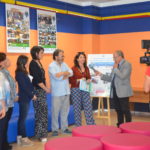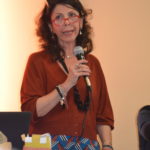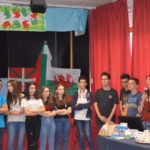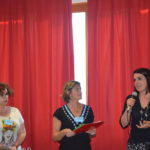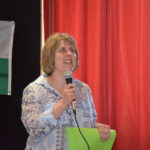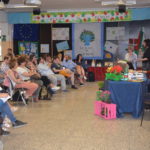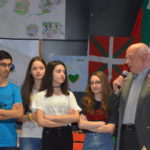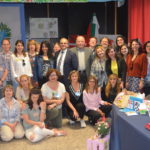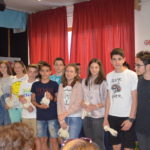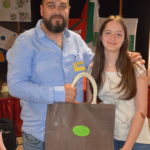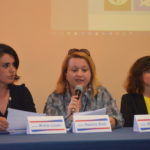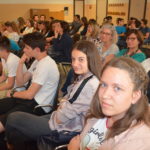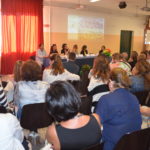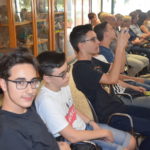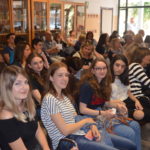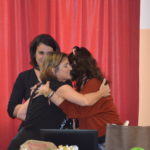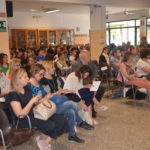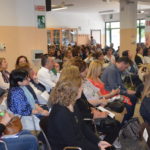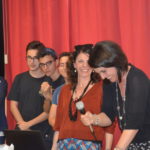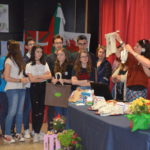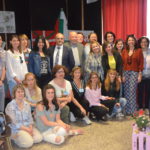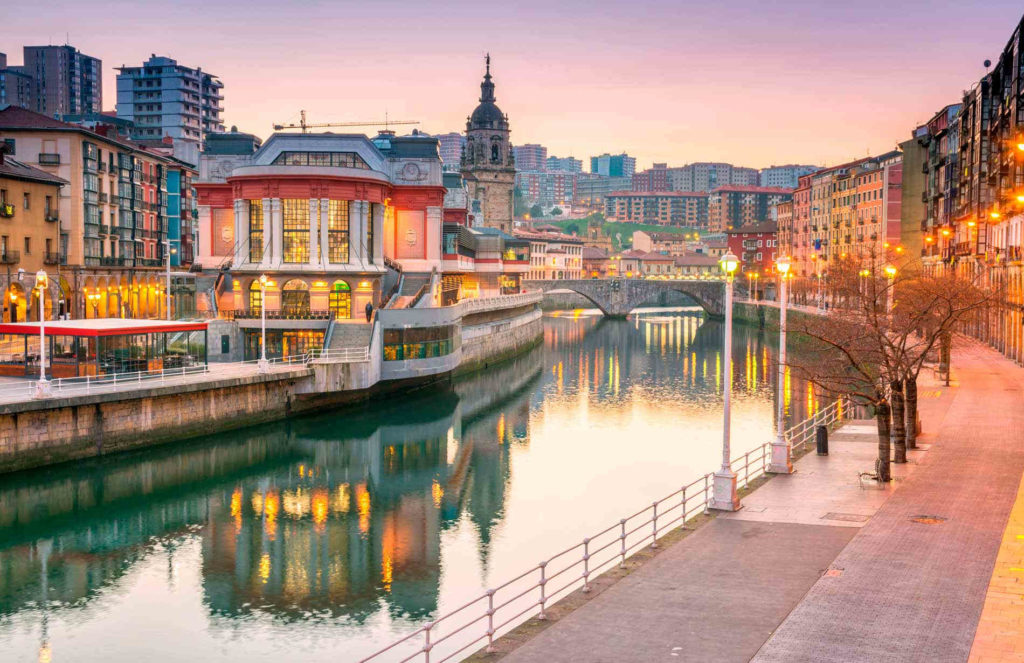Erasmus Program 2 Strategic partnerships between schools only – Closing letter Convention n° 2016-1-IT02-KA219-024333_1
Dear Legal Representative,
hereby we inform you that the National Erasmus Agency + INDIRE on 27.02.2019 has positively concluded the evaluation of the Final Report and of the documents supporting the activity referred to in the object.
The II Final Report was evaluated on the qualitative criteria indicated in Annex III of the Convention (Article IV) and obtained a score of 99.00 / 100 which does not involve any reduction in the contribution.
Below is the result of the evaluation of the Final Report, conducted by external experts:
Relevance of the project / strategy
The well-structured project was based on two fundamental objectives: professional training of teachers and innovation in the field of education with the introduction of entrepreneurship education in the school of the 1st cycle, one of the eight key competences identified as priorities, through a content that is part of the values and culture of the partner schools: environmental sustainability and education for active citizenship. The expected results have been achieved in a more than satisfactory way through a detailed planning of the action, implemented in line with the predictions. The activities, diversified and complementary to each other, have been implemented through the effective cooperation of the four partner schools, with results that would not have been achieved at this level if carried out in their own country. Of great value the opportunity offered to both teachers and pupils to get certifications for the skills acquired during the course. The project has created a network of good practices to address the environmental problems that threaten the areas on which the educational institutions insist; synergies have been achieved between different sectors of education, training and youth, capable of generating short and long-term added value within schools and the territories in which they operate.
Quality of the project design and implementation
The main objectives,
a) implementation of teaching-learning paths to start the acquisition of entrepreneurial skills in the Green Economy, starting from primary school, in a lifelong learning perspective
b) activation of an educational research process on the themes of entrepreneurship and sustainability through research-action work, have positively been inserted into a wider socio-economic reality, favoring possible developments for the future of students. The action was implemented in line with the approved funding; the resources assigned were allocated correctly and in line with the predictions. The activities were reorganized and carried out according to the plan prepared in the planning phase and allowed to achieve the set aims. Some changes in the implementation of the activities are justified by valid reasons for optimizing the results.
The organization of the LTTAs, combined in staff meetings and exchanges of student groups, proved to be positive and allowed the exchange of good practices, the knowledge of different cultures and the improvement of students and teachers’ skills. The involvement of other subjects in some activities was very important, with a consequent improvement in the prestige of educational institutions in their own territories and in a transnational context. The monitoring and evaluation activities are various and described in detail; numerous structured questionnaires in relation to the main activities provide indications on the various surveys and results achieved at all levels. The methodology, which included cooperative learning, interaction between research, ideation and practical implementation in cooperation, has been implemented in different forms and contexts and is described in detail in the main output, the devoted website, where you can find the presentation of the activities and of the methodology in a clear way. The use of the EUROPASS pathway certification system for mobility, was aimed at validating the skills acquired by the target groups.
Quality of the project team and the cooperation arrangements
The partnership originally included 5 schools, some of which had a previous productive collaboration on environmental issues. The work group has been expanded with new partners willing to share, expand and innovate the heritage of previous experiences. Cooperation and communication between the teachers of the partner countries has always been effective and has allowed the Danish Institute to reorganize the activities with respect to the initial plan. An active contribution offered by each partner is shown, balanced in the division of tasks, consistent with all the skills and profiles. Suitable forms of coordination are described, through a detailed program of face-to-face meetings and virtual meetings with the use of virtual communication systems, useful above all during student mobility. The site and the project’s Facebook page were other important vehicles for implementing communication and comparison among the subjects involved. Another virtual space was the “twinspace” of Etwinning, a sort of logbook of the project activities. All communication systems were useful and valid, there were no negative aspects.
Impact and dissemination
Numerous indicators of impact on the different target groups are listed and we refer to assessment tools used to verify the results of the activities. Good results achieved from the qualitative point of view by students regarding the improvement of basic skills and the ability to cooperate in mixed groups, by teachers from the point of view of the methodologies, implemented and shared in situations of cooperation and intercultural enhancement. It underlines the full achievement of the planned objectives, the involvement of numerous stakeholders and the production of tangible and online documentary materials. The results achieved may also be extended to different areas from the reference areas of the proposing organizations. The undertaken agreements between partners and the various stakeholders are described, in order to guarantee an optimal repercussion of the project in an enlarged dimension, and to support it in a period of time superior to that of its implementation.
A more detailed description is given of the impact on the Italian Institute compared to the other Institutes. The dissemination plan complies with the predictions; various channels, social networks, contexts and events were used to present the activities and results of the project, guaranteeing the transfer of innovative practices to promote the quality of learning, adult training and exchanges of experiences and good practices at European level . Educational products and resources have been made available without limitations. The site is easy to access and offers extensive documentation of the carried out activities, with elements of transferability especially in the adopted methodology and in the use of advanced technologies.
Overall comments to the beneficiary
The well-structured project was based on the professional training of teachers and innovation in the field of education with the introduction of entrepreneurship education in the different grades of school through a content shared by the partner schools: environmental sustainability and active citizenship education. For this purpose, an engaging methodological program was developed, based on cooperative learning, digital skills and virtual communication. The expected results have been achieved in a more than satisfactory way through a detailed planning of the action, implemented in line with predictions and using resources appropriately. The activities were carried out by reorganizing the plan prepared in the planning stage because a partner renounced and allowed to achieve the set objectives by enhancing the knowledge and skills of the teachers of all levels regarding sustainable development and entrepreneurship, both as transversal competence and as an engine for the economic development of a future society. The organization of the LTTAs proved to be positive and allowed the exchange of good practices, the knowledge of different cultures and the improvement of key competences for the target groups, especially through cooperation and shared work.
Monitoring and evaluation activities are described in detail; the expected impact is declined for all the subjects involved: students, teachers, but mainly refers to the Italian Institute, as well as the dissemination plan. It is the will of the partners to keep the project results visible, available and sustainable even in the long term, as well as usable for the improvement of educational methods and study programs.
It is recommended to share the results of the reported evaluation with all the project partners.
Following the evaluation of the sent documents, there is a final contribution of € 31,245.00, determined on the basis of what is indicated in Article II.25 of the Convention.
Considering that a pre-financing payment of € 24,996.00 was made, it is therefore a Balance equal to € 6,249.00 which will be paid according to the times indicated in the art. I.4.5 of the Convention.
It is announced that the approved results of the project have been made public on the Erasmus + Project Results Platform.
If you find the above information incorrect, please notify PEC within 30 days of receipt of the documents. Otherwise, this communication is intended as final.
Lastly, it is recalled that, based on the provisions of Article II.27 of the Convention, the Institute may be subjected to checks for five years starting from the date of payment of the final payment (this period is limited to three years if the amount of the grant granted is less than € 60.000,00).
Yours Sincerely
The Coordinator of the National Erasmus + Indire Agency
Dott.ssa Sara Pagliai
